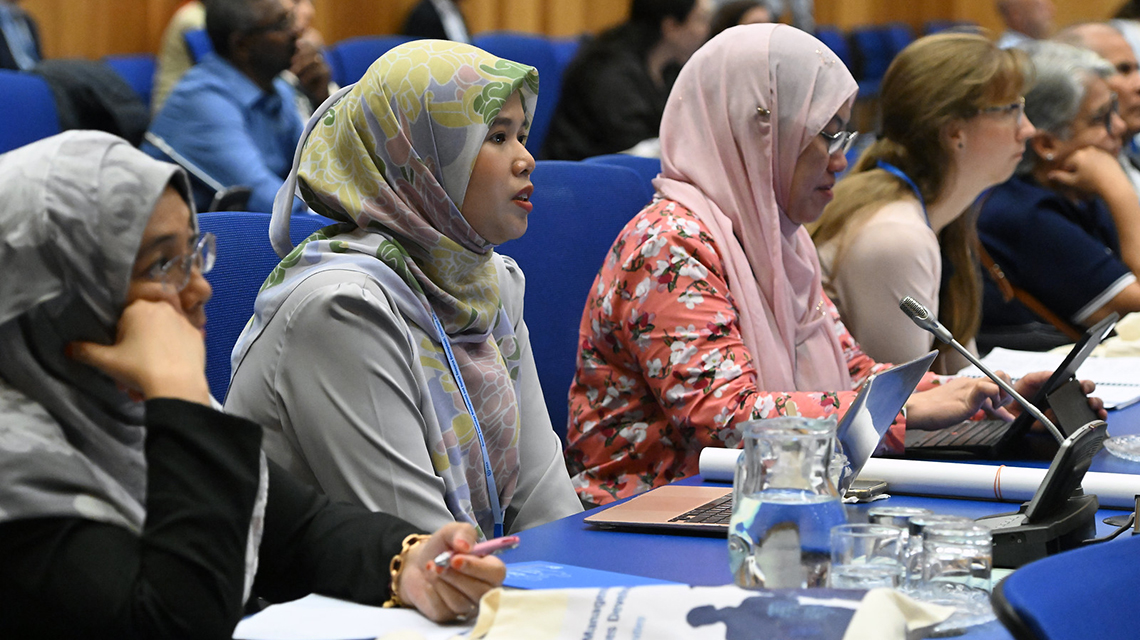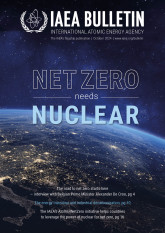
If you would like to learn more about the IAEA’s work, sign up for our weekly updates containing our most important news, multimedia and more.
Nuclear Human Resource Development for a Net Zero Future
Matthew Fisher

An International Conference on Nuclear Knowledge Management and Human Resources Development was held at the Agency headquarters in Vienna, Austria in July 2024.
Human resource development is fundamental to the long-term sustainability and expansion of nuclear power. However, it stands out as one of the most significant challenges facing the industry due to the rigorous demands it places on the workforce.
To help build and maintain the workforce needed to expand nuclear power at the scale envisioned, the IAEA offers capacity building initiatives such as Nuclear Knowledge Management (NKM) Schools, strategic planning training programmes, assist visits and fellowship opportunities. These initiatives are designed to prepare the next generation of professionals and bolster the skills of the current workforce to ensure that nuclear power continues to expand globally as we strive to meet our net zero goals.
As the nuclear power landscape continues to evolve, so too do industry challenges. According to an IAEA report published in 2023, nuclear facility workforces are typically older than those of other major industrial facilities, highlighting the need to emphasize knowledge retention as more and more long-term employees approach retirement. The complex technologies associated with nuclear power plants (NPPs) require longer employee development processes, and nuclear energy activities require exceptionally high levels of oversight. Strong human resource development processes are vital to addressing these and other issues.
“Capacity building as an ongoing and ever-improving process is vital for nuclear power expansion,” says Mikhail Chudakov, IAEA Deputy Director General and Head of the Department of Nuclear Energy. “With considerable expertise cultivated over nearly seven decades, the IAEA is well equipped to assist our Member States in developing the human resources needed to meet their ambitious goals for nuclear power”.
Effective knowledge management is essential for retaining years of acquired information in areas such as design, licensing and operation, which is needed to maintain and build competencies. The NKM School is a one-week course providing specialized education and training in the implementation of NKM programmes in nuclear science and technology organizations. Covering areas such as the fundamentals of knowledge management and practical guidance and best practices, the School is designed for young professionals working in knowledge management roles and has been hosted by several Member States, most recently the United States of America at Texas A&M University in 2023. 2024 marks the 20th anniversary of a joint IAEA-Abdus Salam International Centre for Theoretical Physics NKM School. To date, 1139 professionals have been trained through the NKM School.
The Knowledge Management Assist Visit service provides an expert review to Member States looking to implement or improve their knowledge management programme. The visits are tailored to the knowledge management programme’s level of maturity and can provide strategic advice, specialized training and other relevant support.
Successful teams are always guided by forward-looking, driven leaders. The Nuclear Energy Management (NEM) School programme, supported by the IAEA’s Technical Cooperation (TC) programme, helps current and future leaders in nuclear energy capitalize on their talents and get the most out of their teams. With two-week courses designed for young professionals who display leadership potential, the programme includes lectures, technical visits and case studies to help strengthen managerial and technical competencies and share Agency knowledge in areas across the nuclear energy lifecycle. South Africa’s Department of Mineral Resources hosted the NEM School in November 2023, its 52nd iteration since the programme’s inception in 2010. For 13 years, more than 2000 people from a variety of disciplines have developed their professional skills through the programme, and nearly half of the participants in the NEM Schools held in 2023 were women.
“I’ve had the opportunity to learn about all the different technologies which contribute to net zero, including nuclear power, and it has been very enlightening to learn about how safety culture and leadership are built into an organization,” said Zeridah Kimanywenda, a civil engineer at the Ugandan Ministry of Energy and Mineral Development who attended the NEM School held in South Africa last November. “The content is very well-curated and relevant to my role.”
Although women have achieved some of history’s most revolutionary scientific breakthroughs, they continue to be underrepresented in most if not all technical fields, including nuclear. To address this issue, the IAEA launched the Marie Skłodowska-Curie Fellowship Programme (MSCFP) in 2020 and the Lise Meitner Programme (LMP) in 2023. The MSCFP encourages young women to enter the nuclear field by providing successful applicants with scholarships for master’s degree programmes and the opportunity to undertake an internship at the IAEA or a partner organization. In 2023, 200 scholarships were awarded — the highest number of any application cycle to date. The LMP offers early- and mid-career women professionals opportunities to advance their skills through a multi-week visiting professional programme. The visits are generally between two and four weeks’ duration and may include project development and implementation, as well as technical assignments and discussions.
In addition to these programmes, the IAEA supports over 1000 TC fellows and scientific visitors each year through the TC programme. As the IAEA’s main mechanism for delivering development support to Member States, the TC programme — which is results-based and tailored to the specific challenges faced by countries and regions — aims to facilitate cooperation among countries to build capacity sustainably, including through South-South cooperation.
Developing the nuclear energy workforce of tomorrow requires specific education programmes. Established in 2013, the International Nuclear Management Academy (INMA) scheme supports universities in establishing and delivering master’s degree programmes in nuclear technology management for the nuclear sector, including nuclear power programmes, nuclear applications and radiological technologies. The programmes combine advanced aspects of management and leadership with nuclear technologies, providing high level education and support for future leaders in the nuclear sector. Successful IAEA peer review missions to candidate universities lead to INMA endorsement of the degree programme. As of 2024, there are ten member universities in eight countries.
The IAEA maintains the Cyber Learning Platform for Network Education and Training (CLP4NET), a trove of online learning resources available to the public. The platform includes over 1400 training courses and nearly 200 webinars covering a wide range of topics in nuclear energy, and users can choose between self-directed and instructor-led options.
Related resources
- School of Nuclear Energy Management
- Knowledge Management Assist Visit (KMAV)
- International Conference on Nuclear Knowledge Management and Human Resources Development, 1-5 July 2024
- The IAEA Marie Skłodowska-Curie Fellowship Programme
- Lise Meitner Programme
- International Nuclear Management Academy (INMA)
- Cyber Learning Platform for Network Education and Training (CLP4NET)
- Managing Human Resources in the Field of Nuclear Energy





